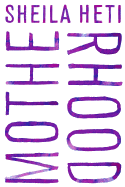
A writer near the end of her fertile years, hounded by anxiety and depression, feels an occasional intense desire for a child. It terrifies her. All her friends are having them. Her partner is against the idea, but would do it if she could be sure. Meanwhile they use risky birth control. In Motherhood, Canadian writer Sheila Heti (The Chairs Are Where the People Go) wrestles with the problem of how to choose an unknowable future based on shifting emotions and the advice of people who have already made their decisions. "Neither path better and neither path worse, neither more frightening or less riddled with fear."
For several years, her protagonist flips coins to answer yes or no questions. In a prefacing note, Heti asserts that though some of this book is fiction, all results of the coin tosses are true. Mysticism alternates with attempts at logic, and neither can provide solid answers. She considers her childhood with a devoted father and work-focused absent mother, and she asks the opinions of her adored and distrusted partner, her friends, random strangers and psychics. Fantasies and neurotic self-consciousness muddle her understanding of solitude, quiet and work as her most secure havens. The book's form is a hammock, or a maze, with the most structure in the beginning and in the emotionally satisfying resolution. In the middle, the protagonist struggles with her indecision over reproduction, her feelings for her partner and what she wants her life to be. "Another dark shadow on a dark lawn: the fact that for a woman of curiosity, no decision will ever feel like the right one." --Sara Catterall

